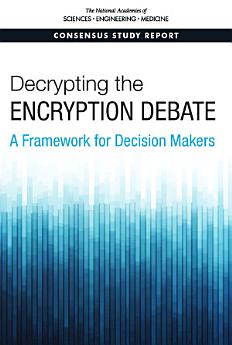Decrypting the Encryption Debate: A Framework for Decision Makers
About this ebook
At the same time, encryption is relied on by criminals to avoid investigation and prosecution, including criminals who may unknowingly benefit from default settings as well as those who deliberately use encryption. Thus, encryption complicates law enforcement and intelligence investigations. When communications are encrypted "end-to-end," intercepted messages cannot be understood. When a smartphone is locked and encrypted, the contents cannot be read if the phone is seized by investigators.
Decrypting the Encryption Debate reviews how encryption is used, including its applications to cybersecurity; its role in protecting privacy and civil liberties; the needs of law enforcement and the intelligence community for information; technical and policy options for accessing plaintext; and the international landscape. This book describes the context in which decisions about providing authorized government agencies access to the plaintext version of encrypted information would be made and identifies and characterizes possible mechanisms and alternative means of obtaining information.
Ratings and reviews
- Flag inappropriate







